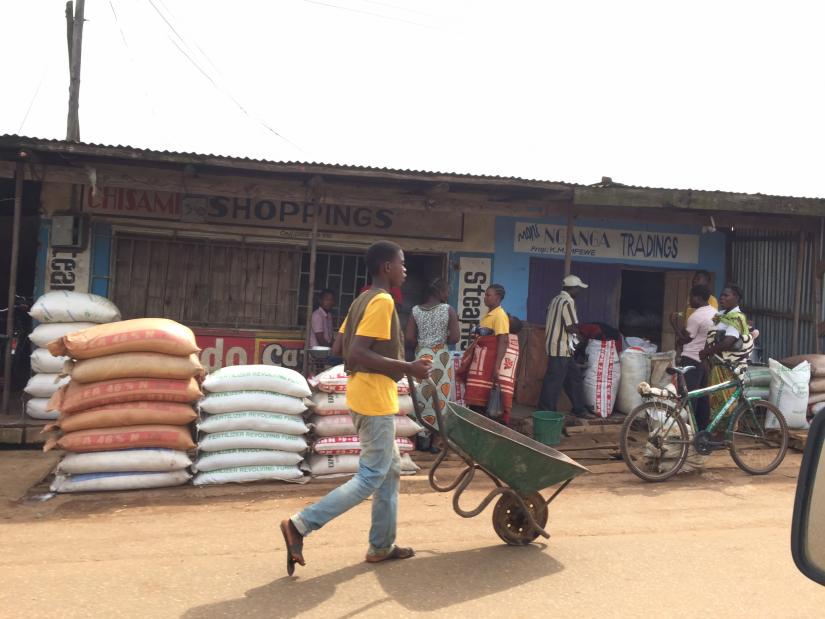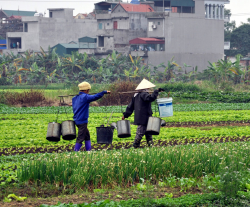By 2050, the world’s population is expected to reach 9.8 billion, and – if we don’t transform the way we produce and consume food – demand for food could be 60 per cent higher than it is today. For present-day governments and industry this raises tough questions about the future of food production.
Missing from the debate about food security however has been the issue of phosphorus and its insecure supply. Simply put, without phosphorus the world cannot produce food. As an essential nutrient in fertilisers for food production, phosphorus has no substitute.
But ground-breaking research from a team at the Institute for Sustainable Futures (ISF) has put global phosphorus scarcity on the international agenda, influencing research priorities and policy decisions. Its collaborative P-FUTURES Cities project brought together more than 90 international stakeholders in Australia, Vietnam, Malawi and the US.
Associate Professor Dana Cordell, Research Director at ISF, says the project aimed to identify major risks associated with phosphorus scarcity and pollution that threaten local food security around cities, and the interventions needed to transform water systems and phosphorus security.
Despite its scarcity, almost four-fifths of the phosphorus mined for food production never actually reaches the food on our forks.
— Dana Cordell, Institute for Sustainable Futures
Under the radar
The road to recognition of this global challenge has been a long one for Cordell, who co-founded The Global Phosphorus Research Initiative (GPRI) back in 2008 with colleagues in Australia and Sweden.
At the time, the GPRI was the first collaborative platform of its kind to address phosphorus scarcity and link it to food security, and many in academia and industry were sceptical it was a problem at all. Even today, despite being one of the world’s most critical resources, unlike water or oil there are no international organisations responsible for ensuring long-term availability of phosphorus, Cordell says.
While all countries need access to phosphorus to grow food, phosphate, phosphate rock is mined in only a few countries. Morocco, China, Algeria, Syria and Brazil together control 85 per cent of the world’s remaining phosphate. Morocco alone nearly three-quarters of the world’s high-quality reserves. Australia is one of many countries highly dependent on imports of phosphate rock and vulnerable to the fluctuating price it commands.
Already many of the world’s farmers can’t afford fertiliser. In 2008, the price of phosphate rock spiked 800 per cent, leading to farmer riots and suicides from India to Haiti. In Australia it prompted a Senate inquiry into fertiliser hoarding and oligopolies.
Phosphorus recovery
“Despite its scarcity, almost four-fifths of the phosphorus mined for food production never actually reaches the food on our forks,” Cordell says. Instead, it’s lost or wasted in the supply chain, often ending up polluting rivers, lakes and oceans.
“The good news is that to safeguard farmers, agriculture, food consumers and biodiversity, there’s a whole toolbox of phosphorus recycling and efficiency measures that could be available. These range from increasing efficient practices in agriculture and mining, to low- or high-tech phosphorus recovery in the sanitation and food waste sectors to changing diets,” she says.
Interventions to address phosphorus scarcity not only contribute to sustainable food systems and better farming, she says, but have knock-on benefits in other sectors.
“We find all these win-wins with other sustainability goals, whether it’s by shifting to more phosphorus-efficient, plant-based diets that also tackle obesity and cardiovascular diseases. Or recycling farm-to-fork phosphorus waste that not only reduces food waste destined for landfill but can generate renewable energy and fertiliser too. The next step is policy action to stimulate and support these innovations.”
Policy action
Widely regarded today as world experts on the issue of phosphorus vulnerability and sustainability, the ISF team is sought after to inform and guide research and policy responses to this global challenge. This has included Cordell being selected in a competitive tender from the European Commission to investigate the implications of phosphorus scarcity for European Union Member States. The Commission was the first government in the world to take public policy action towards phosphorus security.
Associate Professor Cordell says Europe and the UK are more aware of the problems of food and phosphorus security and are addressing the issue with greater urgency than Australia.
In a first for a national government, in 2018 the UK invited ISF to assess the phosphorus vulnerability of its food system as a core part of a new and ongoing research project known as RePhoKUs (Refocusing Phosphorus Use in the UK Food System).
RePhoKUs brings together experts in catchment science, adaptive capacity and food system vulnerability from academic and agricultural institutions in the UK, with the ISF team brought in as the only non-UK partner because of their international expertise.
“Our role is to understand and create an environment for change that’s sensitive to the constraints on farmers and other food system stakeholders – such as how farmers can use the ‘legacy’ phosphorus built up in soils from past fertiliser use to reduce both their costs and the UK’s reliance on imported fertilisers,” says ISF Associate Professor Brent Jacobs.
The UK will also draw on ISF’s expertise in exploring the socio-economic and institutional barriers that need to be addressed and in helping stakeholders co-design an evidence-based, national phosphorus transformation strategy.
“What are the national priorities? What needs to happen first, who needs to be involved? Is the governance landscape too fragmented? Where is the technical know-how? Is there political will? These are the questions to be asked and the barriers to overcome,” says Cordell.
ISF will continue to raise awareness about phosphorus sustainability in Australia, she says, but that action must follow. Especially in a country where most of the population live in cities, creating opportunities for a circular economy.
“This will ultimately transform cities from being huge polluters and consumers of finite resources, to producers of renewable fertilisers, ensuring both our farmers can feed the population and our water is clean for drinking, biodiversity and recreation.”
MEDIA
The phosphorus problem no one is talking about – ABC, March 2021
Humanity Is Flushing Away One of Life’s Essential Elements – The Atlantic, February 2021
Researcher
-
Research Director
Year
2008-
Location
Worldwide
PROJECT | 2015-
P-FUTURES
Transforming the way cities secure food and water through innovative phosphorus governance.





